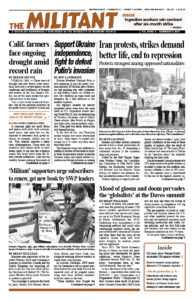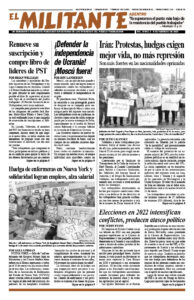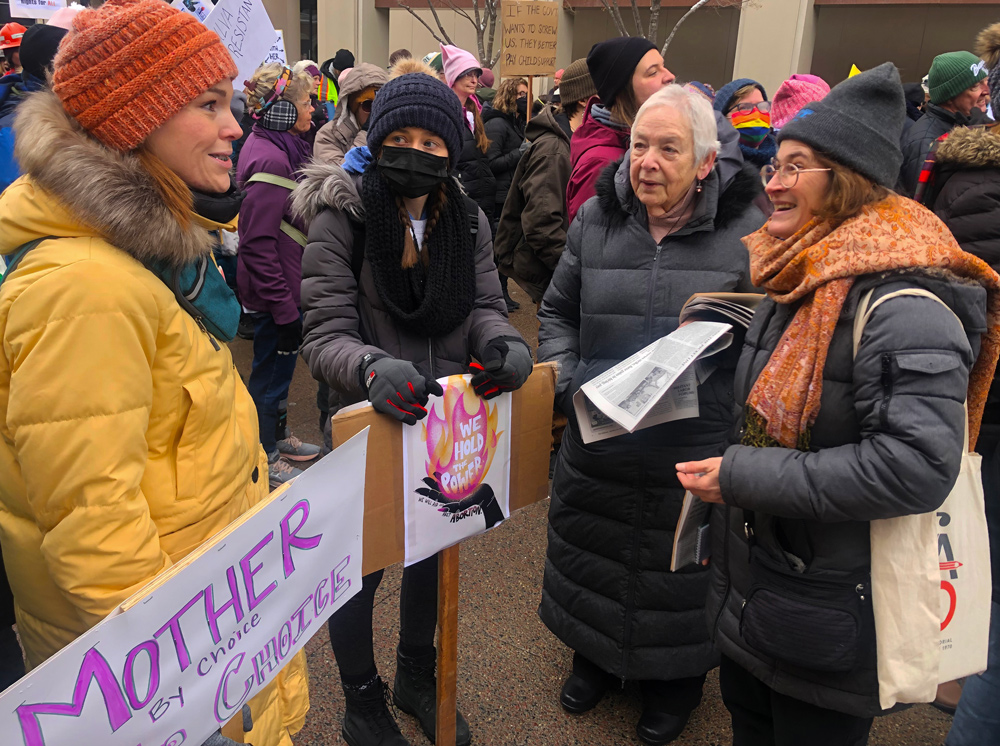MADISON, Wisc. — Some 2,000 people took part in a women’s march and rally here Jan. 22 calling for the overturn of an 1849 state law banning nearly all abortions, and for the reopening of clinics that provide the procedure. Similar actions were held around the country the same day to protest the U.S. Supreme Court’s Dobbs ruling that overturned Roe v. Wade last June.
Organizers of the Madison action called for getting out the vote to elect a liberal judge to an open spot on the Wisconsin Supreme Court as the way to advance their aims.
Members and supporters of the Socialist Workers Party campaigned for a different class course, starting from the fact that the fight for women’s emancipation is bound up with combating the devastating effects of today’s capitalist crisis. They got a serious hearing.
Following the overturn of Roe v. Wade, opponents of abortion in Wisconsin have sought to implement the 1849 law. As a result, women seeking abortions must travel to neighboring states such as Illinois and Minnesota. Most speakers at the main rally denounced the Dobbs’ ruling as a blow to women’s rights, and promoted electing Democrats on a state and federal level.
Speaking during an open mic at the end of the program, Ilona Gersh, Socialist Workers Party candidate for Chicago mayor, started from a working-class perspective.
“Birth rates are down, suicide and drug addiction are increasing, young adults are forced to live with their parents for an extended time,” Gersh said. “We need a union-led fight for jobs — with wages and conditions that allow workers to support a family. We need to fight for child care, health care, cost-of-living raises. And for access to contraceptives and safe, legal abortion when needed.
“Working people are beginning to use their unions to fight for these things. We need to build a labor party, based on our unions. Not look to the Democrats and Republicans, the capitalist parties that have gotten us to this point,” she said.
These were some of the questions SWP members and supporters discussed and debated throughout the day.
“I don’t agree with looking to the courts to advance our interests,” Gersh told Claire, a volunteer handing out flyers urging participants to vote in the upcoming state Supreme Court election. “The Roe v. Wade ruling was the Supreme Court acting as a legislative body. Dobbs was good, because it put the issue back to the states and the people. We need to take advantage of that and debate the issue to win a majority. What we need is a fight to repeal the 1849 law.”
“I think of the court election as a stopgap measure,” responded Claire, who didn’t want to give her last name. “Getting a different balance on the court can block the law. I agree the Democratic Party has failed us, but I’m scared for women’s lives right now.” They left it at that, and each continued talking to other participants.
As the march gathered, Gersh spoke with nursing students Jessica Forsgren and Ashley Morgan. “The biggest obstacle we have is people are so divided between Democrats and Republicans,” Forsgren said.
“What’s at the root of sharpening conflicts today is actually the divide between the capitalist class and the working class,” Gersh said, “as the bosses and their government make us pay for their crisis.”
“Well, it’s a big step to reach that understanding,” said Forsgren.
Gersh pointed to Malcolm X, who explained his aim was not to awaken African Americans to their oppression, but to their self-worth, to their own capacities. “There’s more resistance by working people today, you can see it in some of the labor battles taking place,” she said. Forsgren and Morgan had been following some of those fights, including the strike by nurses at Mount Sinai and Montefiore hospitals in New York, and got a copy of the Militant.
This Militant correspondent talked with Parker Rosenbauer, a young data consultant who had just signed up for a subscription to the paper.
From the stage someone started chanting, “A fetus is not a baby.”
“I don’t like that chant,” I said. “You can’t win the political argument for why abortion should be decriminalized like that. A fetus will become a baby if a pregnancy is carried to term. We can’t deny there’s a question of life involved.”
Opponents of women’s rights, “call a fetus a baby to say abortion is murder,” Rosenbauer said. “Women dying because they can’t get a safe abortion is also a question of life.” But he agreed the chant was not helpful.
The interest in discussing the SWP’s program and course was reflected in the 18 participants who subscribed to the Militant at the action. Nearly 50 got a single copy.
Elsewhere, Joanne Kuniansky, SWP candidate for New Jersey state Senate, spoke at a Women’s March rally of 180 in West Orange, New Jersey, the same day. She got a good response when she called for solidarity with workers on strike at Harper Collins in New York City. Many of the strikers are women who can’t live in New York on what they make. “Today I don’t mourn the reversal of Roe v. Wade,” Kuniansky told participants. “The Dobbs decision did not ban abortions.” It opened a “debate to win a majority of working people to support decriminalization.”
“I came to the rally because I support accessible health care,” Diana Chica told Lea Sherman, SWP candidate for New Jersey General Assembly. “I want to make sure that if a woman does need to have an abortion in some medical situations, she can,” she said. Chica works as a doula, providing guidance and support to pregnant women during labor.
“Women need maternal health care,” Sherman replied. “There is a lack of it for working-class women.”
Chica was one of two women who got Militant subscriptions.
Roy Landersen in New Jersey contributed to this article.


